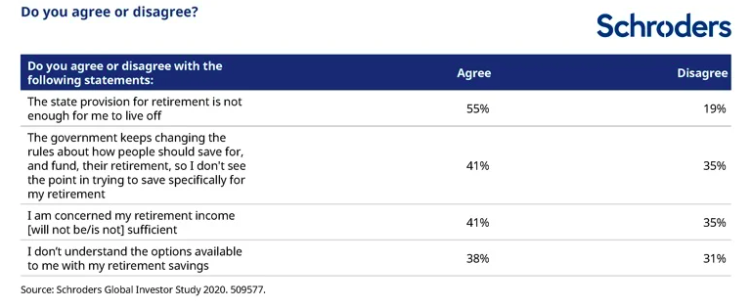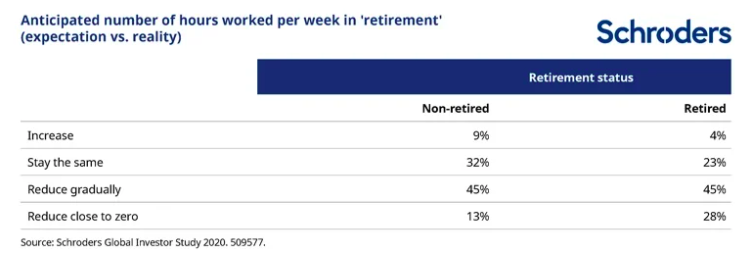
Savings shortfall: 41% worry they won’t have enough to retire

If you are worried you will not have enough saved for your retirement, you are not alone, a major new study has found.
Figuring out how much you should save for your retirement is never easy. Your needs change over time, just as your income fluctuates.
If you knew exactly how much you would earn in your working life, how much your investments would return and how long you’d need to live on retirement, your financial planning would be a doddle.
But, as 2020 has proven, it is impossible to predict anything with certainty. That is perhaps why so many of us are concerned that we will run out of money in retirement.
According to Schroders Global Investor Study (GIS) 2020, 41% of investors globally fear that they won’t have sufficient savings to fund their retirement.
GIS is an independent online survey of more than 23,000 investors across 32 worldwide locations conducted between 30 April and 15 June 2020.
- Find out more about Schroders Global Investor Study 2020 by visiting www.schroders.com/gis.
The older we get the more worried we become
The worry over retirement funding appears to become more acute as we near retirement age.
Nearly half (47%) of people aged 71 and over, and 43% of Baby Boomers (51-70 years of age), said they were concerned their retirement income will not be enough. That compares with 39% of Millennials (aged 18-37).

What is the problem?
The pandemic, job security and general uncertainties of life aside, many don’t trust their country’s state pension to provide enough of a safety net in retirement.
Asked whether they agreed or disagreed, the study found 55% of investors agreed that the state provision for retirement is not enough to live off. Just 19% disagreed.
Also, the constant shifting of the rules as to how the pension system in their country works has left many bewildered.
A significant number of investors (41%) agreed that governments’ changing of the rules, meant that they didn’t see the point in trying to save specifically for retirement at all. Only 35% disagreed.

Pension rules seem to change with the seasons
Investors are struggling to keep up with the demands of saving for retirement. The pandemic has placed added pressure on job security and squeezed workers’ incomes.
Soaring global government debt and low interest rates, in part the result of the global financial crisis, have been exacerbated by the pandemic. Growing life expectancy has added to governments’ costs of providing state pensions.
State pension case study: what’s changing in the UK?
From October this year, men and women in the UK will now have to wait until they are 66 to draw their state pension. This comes after a decade of increases in the qualifying age for the benefit.
There are plans for more changes. The retirement age is set to rise to 67 gradually between 2026 and 2028; a further rise to 68 is due to be phased in between 2044 and 2046, depending on when you were born.
To put these changes into context, when the first old age pension was introduced in the UK in 1908 it did not start paying out until the age of 70. Life expectancy at birth was 40 years for men and 43 for women, and only 24% of people reached state pension age. Those who did would typically claim it for nine years.
By 2017, 85% of people were reaching the state pension age and the typical life expectancy for those who did was another 24 years.
The UK is just one example and is not alone.
Rupert Rucker, Head of Investment Solutions, said: “It is a concern that the complexity and constant changing of the pension rules is putting people off saving for retirement. Unfortunately, that doesn’t look like changing anytime soon.
“Governments are deep in debt and will look at ways at reducing that debt in future. They have been doing it for a while but they are purposely shifting responsibility for retirement savings from the state to the individual.
“There is no easy answer. However, avoiding saving for retirement is not it. It just kicks the can down the road. We have to take individual responsibility and understand better how much we need to save or learn to live with less income.
“The best advice is to save something, preferably as much as you can afford, from as early as possible. But always speak to a financial advisor.”
So what are people doing about it?
Amidst these concerns around retirement income, it makes sense that the majority of people see themselves working into their “retirement”. Retirement now is undergoing a transformation, with many people carving their own paths.
While the majority still see themselves reducing their working hours in retirements a significant proportion do not.

Rupert Rucker said: “It is noteworthy that people are understanding more they need to take responsibility which is a change from the previous generation.
“There are three simple choices to make. It is really up to individuals to decide their own compromises understanding how much life expectancy has increased: Continue to earn money into retirement years, save more for retirement, spend less in retirement.”
- Find out more about Schroders Global Investor Study 2020 by visiting www.schroders.com/gis.
Important Information: This communication is marketing material. The views and opinions contained herein are those of the author(s) on this page, and may not necessarily represent views expressed or reflected in other Schroders communications, strategies or funds. This material is intended to be for information purposes only and is not intended as promotional material in any respect. The material is not intended as an offer or solicitation for the purchase or sale of any financial instrument. It is not intended to provide and should not be relied on for accounting, legal or tax advice, or investment recommendations. Reliance should not be placed on the views and information in this document when taking individual investment and/or strategic decisions. Past performance is not a reliable indicator of future results. The value of an investment can go down as well as up and is not guaranteed. All investments involve risks including the risk of possible loss of principal. Information herein is believed to be reliable but Schroders does not warrant its completeness or accuracy. Some information quoted was obtained from external sources we consider to be reliable. No responsibility can be accepted for errors of fact obtained from third parties, and this data may change with market conditions. This does not exclude any duty or liability that Schroders has to its customers under any regulatory system. Regions/ sectors shown for illustrative purposes only and should not be viewed as a recommendation to buy/sell. The opinions in this material include some forecasted views. We believe we are basing our expectations and beliefs on reasonable assumptions within the bounds of what we currently know. However, there is no guarantee than any forecasts or opinions will be realised. These views and opinions may change. To the extent that you are in North America, this content is issued by Schroder Investment Management North America Inc., an indirect wholly owned subsidiary of Schroders plc and SEC registered adviser providing asset management products and services to clients in the US and Canada. For all other users, this content is issued by Schroder Investment Management Limited, 1 London Wall Place, London EC2Y 5AU. Registered No. 1893220 England. Authorised and regulated by the Financial Conduct Authority.
